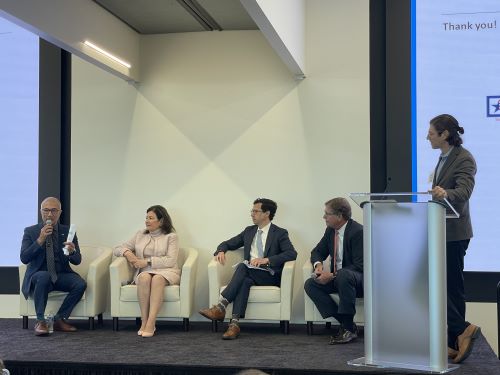The Rational Middle of Immigration Unveils Latest Documentary Film
Panel discusses Immigration Policy in the Best Interest of Every American
 With the topic of immigration rising to the forefront of American politics, misinformation and false narratives have been promulgated by self-serving politicians and special interests on both sides of the political spectrum. This process has caused a polarization in opinions on the issue of immigration, to the point that the policy solutions that represent the best interest of America are being inhibited by the fears politicians have of angering their most radical constituents. Rational Middle, an organization that creates short films to help people understand contentious issues, activate discussions, and create dialogues to encourage solutions to important problems, unveiled their newest film about immigration during an event at Rice University’s Baker Institute for Public Policy in Houston. The project was produced with the support of the Center for Houston's Future.
With the topic of immigration rising to the forefront of American politics, misinformation and false narratives have been promulgated by self-serving politicians and special interests on both sides of the political spectrum. This process has caused a polarization in opinions on the issue of immigration, to the point that the policy solutions that represent the best interest of America are being inhibited by the fears politicians have of angering their most radical constituents. Rational Middle, an organization that creates short films to help people understand contentious issues, activate discussions, and create dialogues to encourage solutions to important problems, unveiled their newest film about immigration during an event at Rice University’s Baker Institute for Public Policy in Houston. The project was produced with the support of the Center for Houston's Future.
Framing the context of the Rational Middle Immigration films and the importance of a thoughtful debate on this important topic, Dr. Tony Payan, Director of Mexico studies at the Baker Institute, stated that… “Americans continue to demand that immigration be dealt with in a way that is fair to the country, to the law, to the economy, and to immigrants themselves.”
Stan Marek, CEO of MAREK Construction, shed some light on one of the critical roles that immigrants have, and will continue to have, in the rapidly developing city of Houston and state of Texas. “Everything you see here,” he said as he pointed to the surrounding space “my team of immigrants built. 85% of the construction industry in Texas are immigrants, and half are undocumented, not because they want to be…they’ve never had an opportunity for legal status after 1986. It’s broken.”
“The first thing we have to do is solve the immigration mess,” Marek said. “The easiest solution? ID and Tax.” By granting legal status to illegal immigrants who have been in the US for five years and can pass a background check, and mandating the use of e-verify so that they will work for employers that pay and match taxes, this would fix the problem, he explained.
Filmaker Gregory Kallenberg said that his initial response to taking on the difficult task of addressing a rational middle of immigration was “Hell no, because it’s the third rail; a place where how can you find the middle when there is so much divisiveness and tension?” However, he explained that he decided to take the project on because “there are people out there that are so afraid to speak because people on the other side of the issue…are so adamant that they’re right about everything that they think…the problem is, the facts… and the arguments they give are wrong…That’s what we’re exploring with these episodes.”
Kallenberg then showed two of the Rational Middle of Immigration’s documentary films to the audience: “The Immigrant’s Promise,” and “Immigration’s Crossroad: Rebuilding After Hurricane Harvey.”
In the second film, Mike Holland, COO of MAREK, made the point that the US, in certain industries like construction, is facing a workforce crisis, especially in the aftermath of Hurricane Harvey. “We have an exiting generation of boomers, at a rate of 10,000 a day are retiring, and we’re seeing a big gap in the workforce.”
During the same film, Marvin Odum, Chief Recovery Officer for the city of Houston, also expressed concern about the workforce shortage, and the extended time of suffering that people who have lost their homes and cannot find the help they need to get them rebuilt will face as a result. “We need to find a way to bring those people out of the shadows to allow them to work and pay taxes while they work on obtaining legal status… As a representative of the city, I need a legal way to be able to access that workforce… Not necessarily trying to convert those individuals to full-fledged legal citizens, but this idea, can you get identification, can you get put into a special category, we would love for that to happen.”
After the films were shown, Executive Producer of the Rational Middle of Immigration and former Houston Chronicle business columnist Loren Steffy led a panel discussion of experts on the issue.
Charles C. Foster, who served as an advisor to President George W. Bush, and is Chairman of Foster LLP, one of the largest global immigration law firms, raised the point that certain misconceptions arise about immigration because many Americans just do not realize how extremely restrictive our legal immigration system is. “Often you will hear people say ‘those people should go back home, get in line, and come in legally’… However, he explained that unless you have family members in the US, the process of coming to America legally is extremely restricted. He also pointed out that due to chapter 40.9 Section 212(a)(9) of the Immigration and Nationality Act, “If you’re here illegally, even if you’re otherwise qualified…you have to go home first and wait ten years before you apply… Our whole system makes it virtually impossible for people that are here undocumented to ever qualify [for legal status].”
Dr. Tony Payan, who was also on the panel, highlighted the fact that due to the US’ aging population demographic and the resulting labor shortage that could reach crisis levels in the future, immigrants may be the only way the US can sustain maximum economic growth. “What are the reasons an economy grows? Almost any economist will say population growth, because when you add people to an economy they become workers and consumers… the other thing is productivity…even with the 1,000,000 green cards that are handed out every year and the undocumented that are here, the population is barely holding,” he said. Subtract the number of people that die and consider the collapsing birth rate and the aging population demographic, and the US is a “quickly aging country that needs new, productive, young, and taxpaying workers..The immigration policy, as it is conceived today, is not economically wise…it’s going to create an enormous demographic crisis and cause the US economy to shrink bit by bit,” he said.
Dr. Stephen Klineberg, Founding Director of the Kinder Institute for Urban Research, explained that the issue of having approximately 10 million illegal immigrants in the US today can be explained by economic supply and demand and a broken immigration system. “The reason why we have so many illegal immigrants in this country is that for 30 years, we have not allowed enough people to come here legally to do the jobs that we desperately needed to have done, by people who desperately needed to do them…the jobs are here waiting for them, needing them, and they can’t get here legally,” he said.
Speaking on another common misconception, that illegal immigrants do not pay taxes and are a cost to America and taxpayers, Foster pointed out the fact that “One study after another show that the economic impact of immigration, both legal and illegal is always positive…immigrants, documented or undocumented, for the most part, pay taxes like you and me. They pay taxes on their food, everything they buy, cigarettes, beer…indirectly real estate taxes, whether they rent or not,” he said. Additionally, many illegal immigrants pay income taxes by using something called an ITIN (Individual Tax Identification Number), which does not require legal immigration status to obtain.
Foster also said that many of the misconceptions that Americans have about immigration come from false narratives created by “FAIR, NumbersUSA, and the CIS, [that] all try to have an appearance as legitimate organizations, but they’re all controlled and set up by the same person, John Tanton. These are big anti-immigrant organizations that believe in zero immigration… these key people see immigration as a zero-sum game- that every immigrant must take away a job or hurt some Americans."
This argument, that immigrants take away jobs from Americans, is fatally flawed by the economist-coined “lump of labor fallacy,” because it assumes that there is a fixed amount of work available in the American economy. In reality, population expands the economy and creates its own jobs. For example: a larger population that needs to buy more groceries will increase demand on grocery stores. This increased demand, in turn, will generate more revenue for the shop and lead to the hiring of more grocers to handle the increase in busines
Americans should avoid buying into false political narratives, put emotions aside, and evaluate the facts on immigration and our great nation’s history. For the betterment of our nation and all Americans, we must work together to understand and advocate the most effective solutions to our country’s broken immigration system.
The Rational Middle of Immigration seeks to inform the general public, shape sensible policy solutions, and create a deeper understanding of this important challenge by focusing on the challenges facing the country through the eyes of immigrants, municipalities, business owners, and citizens on the ground who find themselves confronted with this issue.








